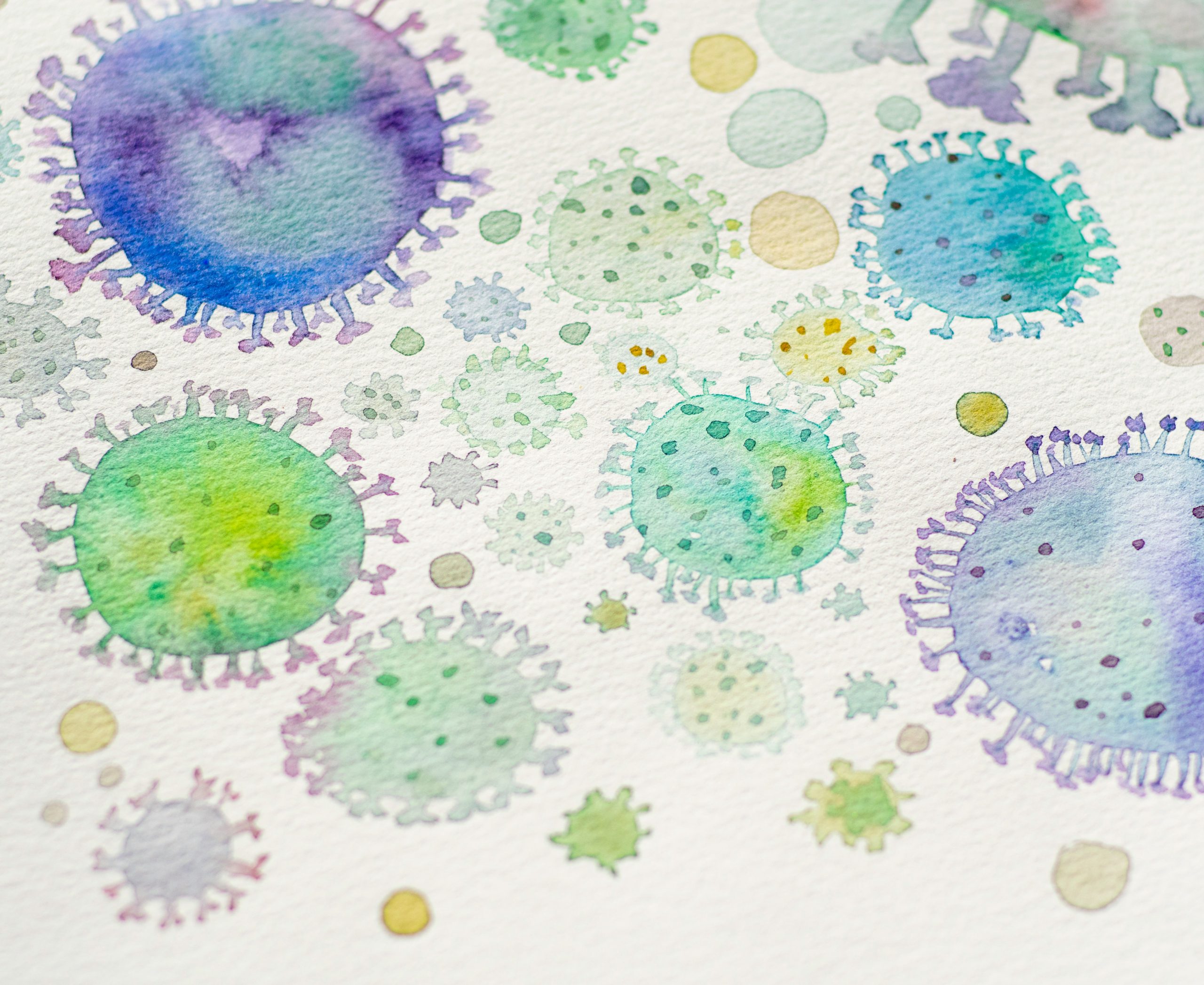How does our immune system set us up to fail? Photo credit: Elena Mozhvilo via Unsplash
The immune system is nature’s anti-hero. Our ability to knock back countless microbial challenges to our health ought to be celebrated more. Imagine if our bodies could send us a notification each time it successfully fought off a new virus or bacterium—complete with a breakdown of the symptoms that could have been: the dopamine hits from this would be equivalent to that of doomscrolling on social media. Paradoxically, it is this same immune system that can be the source of harm. A hypersensitive immune system leads to severe, often life-threatening allergies (e.g. to nuts or shellfish, or both depending on your luck of the draw). Likewise, rheumatoid arthritis, type 1 diabetes, and multiple sclerosis (MS) are all examples of autoimmune diseases. Deriving from the Greek word ‘autos’ meaning self, here, the body recognises its own cells as foreign, eliciting immunity against oneself in a detrimental fashion. Surprisingly, scientists are also finding that a genetic predisposition to heightened immune responses can be a key risk factor for pathogenesis of age-related neurodegenerative diseases such as Alzheimer’s. All the above would suggest that our definition of what constitutes a fully functioning immune system must be rethought. To this end, we are left to wonder: is it possible for our immune systems to be “too good” for us? And what makes this question so simple to ask, yet so difficult to answer?
The phenomena of ageing and immunosenescence
As children, we took for granted how quickly we could recover from sickness. In true karmic fashion, our natural immunity wanes with age, in a phenomenon known as “immunosenescence”. Accompanying this is a reduced ability to respond to infections, and a reduced capacity for long term, adaptive immune memory. This forms the basis as to why vaccinations tend to have the least efficacy in the elderly.
In true karmic fashion, our natural immunity wanes with age…
An important part of our natural immune response is inflammation, the recruitment of more blood, nutrients, and immune cells to the sites of infection or injury. While this process is helpful in acute (or short-term) cases, it becomes problematic when it occurs for too long, in healthy tissues, or in the absence of infection. Chronic inflammation has been implicated in a myriad of conditions such as mental health disorders and cancers.
A basal level of sterile, chronic inflammation develops and increases with age, in a process known as “inflammaging”. Immunosenescence and inflammaging are not mutually exclusive and have been found to act upon one another. It is also apparent they are not processes that occur by chance, and that there are genetic factors contributing to this loss of control and subsequent disarray.
Immunity versus mortality: lessons from the pandemic
Infamously, we saw an example of immunosenescence and inflammaging at large—during the COVID-19 pandemic, in which people had extremely different responses to infection. A study analysing data collected from over half a million patients and across five nations found that mortality rates increased exponentially with age, after the age of 50. This serves as a small but powerful extrapolation from the ~777 million documented COVID-19 cases globally.
Of all deaths associated with COVID-19 infection, ~70% have been attributed to organ failure of the lungs directly triggered by excessive inflammation. This reaction is often coined, and/or caused, by cytokine storms: a reaction in which cytokines, pro-inflammatory signalling molecules, are released in excess, and abruptly. In turn, this manifests physically as respiratory failure, through increased permeability of vessels in the lungs and build-up of fluid and blood cells in our alveoli, impairing gas exchange.
Our innate immunity cannot take all the blame for reacting too strongly, as SARS-CoV-2 is a tricky customer, capable of hijacking the immune system to elicit this overreaction. Nevertheless, the varying levels of responses and disparity in mortality between different age groups indicates patient outcomes are heavily influenced by underlying inflammaging, and respective basal levels of chronic inflammation compounding with that imposed by the virus.
As of 2023, 65 million people were reported to suffer from long COVID, with a peak age group for diagnoses of 36–50 years of age. Long COVID refers to health complications which persist long after infection, lasting any amount of time between weeks to years, with high variability. Neurological symptoms range from “brain fog”, to outright seizures, loss of taste and smell, and unending bouts of fatigue. All from one viral infection event, and the subsequent host response. The varying combinations of symptoms, or lack thereof altogether in certain patients, is fascinating and goes to show just how important it is to take account of an individual’s immune system and its potential for harm, and not just the pathogen in question.
Evolution probably did not expect us to live this long
As alluded to earlier, the processes of immunosenescence and inflammaging have been found to be regulated genetically. This is a compelling observation as it would go against classical theories of evolution. If said genetic elements are proving to be disadvantageous to us in the long run, then why are they still being naturally selected for?
…the processes of immunosenescence and inflammaging have been found to be regulated genetically.
Professor Claudio Franceschi proposes the antagonistic pleiotropy hypothesis of ageing (stay with me), to answer this question. Pleiotropy, in this case, refers to the ability of a single gene to have multiple unrelated roles or traits within an organism’s lifespan. The antagonism here suggesting that this very capability opposes, and can be hostile to the organism, with respect to ageing. The hypothesis posits that, the complex genetic interactions which would have helped humans achieve an average life expectancy of 20–35 as in Ancient Rome, simply collapse in the face of the challenges that humans of today living upwards of 70 years encounter. Answering a question with a question essentially, arguing, “if evolution never foresaw us living this long in the first place, then how can we expect the same processes that were beneficial in our infancy, to not be detrimental in our seniority?” Evolution takes millions of years to get things right. Meanwhile, we continue to defy expectations and extend our lives through advances in modern medicine. Perhaps we just ought to wait a million or two more for our immune systems to catch up to what is required of them today.
The hypothesis posits that, the complex genetic interactions which would have helped humans achieve an average life expectancy of 20–35 as in Ancient Rome, simply collapse in the face of the challenges that humans of today living upwards of 70 years encounter.
Returning to our initial question of ‘can our immune systems be “too good” for us?’ First, you would need to define what “good” or “normal” actually means, acknowledging that Mother Nature has no favourites and does not subscribe to our needs. For example, she surely does not care how dysregulated inflammation of the lungs (in the form of asthma) may stifle our athletic ambitions, or with how attractive we look on a given day with respect to inflammation of the skin (as in eczema or dermatitis). She also clearly has the ‘best sense of humour’, as per Thomasy’s article on When Scientists Become Allergic To Their Research, targeting the very people trying to figure her out. Maybe, these musings are rich, and it is not a question worth asking. Especially, when written in a country with rapid access to quality medicine and a healthcare system that affords a life expectancy from birth of over 80 years: we are afforded the luxury to live long enough to critique why we do not live even longer.
Mother Nature has no favourites and does not subscribe to our needs.
The answer may be, that there is simply no such thing as “too good” or even “too bad” in that sense, if we are indeed living longer than ever before. Rather, the question is a call to action to not be afraid to dissect these parts of ourselves, that which we trust implicitly and are so sure of. Further research in this field will expand the definition of “immunocompetence”—the body’s ability to produce a “normal” immune response—and level the playing field. This will inspire novel, exciting ways of tackling life-threatening conditions that we are collectively having little luck with at present, be it diabetes, Alzheimer’s disease, or cancer.
As we age, the beautifully complex ways in which we protect ourselves, become convoluted puzzles for us to decipher in our ambition to live longer, and minimise suffering. Who doesn’t love a good puzzle?





